Key Takeaways
• MHS Aviation moved two Challenger 604 jets to Elangeni, finishing the switch on April 30, 2025.
• The aircraft now operate under Elangeni’s Austrian Air Operator Certificate (AOC), changing their flights from ‘MHV’ to ‘ELG’ codes.
• This strategic transfer provides owners and clients more control, flexibility, and access to an expanded, multinational fleet.
Germany’s MHS Aviation has taken a major step by moving its Challenger aircraft operations to Elangeni, an Austrian partner company. This shift, officially finished on April 30, 2025, marks a new phase in how these organizations run their business jets across Europe and likely has direct impacts for aircraft owners, travelers, and the wider charter industry.
Key Facts: What Happened and Who’s Involved

MHS Aviation is a well-known operator of private and charter jets based in Germany 🇩🇪. Recently, it decided to relocate two Bombardier Challenger 604 jets to Elangeni, a company based in Austria 🇦🇹. These jets now operate under Elangeni’s Air Operator Certificate, which is often called an AOC. The AOC is the official approval needed for any company to fly aircraft commercially in a country.
Before this change, the jets flew under the “MHV” code, clearly linking them to MHS Aviation in Germany. Now they have the “ELG” code, showing they’re part of Elangeni’s operations in Austria. The switch covers two Challenger 604 aircraft that were popular choices for VIP and group charters. It’s important because changing an aircraft’s AOC registration means shifting responsibility for how the plane is run, checked, and maintained. This can impact rules, taxes, paperwork, and safety standards.
According to information reported by VisaVerge.com and several industry sources, the move is not just about paperwork. It shows these partners want to give aircraft owners and clients more choices and flexibility in a fast-changing and closely regulated sector.
Why Make the Move? Strategic Reasons Behind the Transfer
For many, moving aircraft from one country’s operator to another might seem strange. However, there are strong reasons for this:
1. Better Operational Flexibility
Different countries in Europe have their own rules for running private jets. Some might have more strict safety checks, while others might make it easier to offer flights to certain places. By running part of its fleet under an Austrian AOC, MHS Aviation gives aircraft owners new choices. If Austria’s laws make things easier for a certain operation, the owner can use those benefits through Elangeni. If Germany’s rules are better for other reasons, those options are still available under MHS Aviation.
2. Fleet Sharing Means More Choices
Both MHS Aviation and Elangeni are managed under the same corporate umbrella. This means that together, they can share a bigger fleet of charter aircraft. When someone needs to book a jet, they get access to a wider selection. Plus, aircraft can be registered in either country, depending on where and how they plan to fly. This makes it easier for both companies to use their planes where there’s most demand, inside and outside Europe.
3. Better Aircraft Management Services for Owners
Elangeni, while also offering charter flights, is known for focusing on tailored aircraft management. This means it puts special effort into making things clear and simple for aircraft owners. For example, owners get clear cost breakdowns and have more control over how their jet is used, who flies it, and which third-party suppliers are involved.
Owners often worry about hidden fees or losing control when their aircraft are managed by outside companies. Elangeni’s approach aims to solve these problems by being transparent and flexible. This is especially important for high-value aircraft like Challenger jets, where costs can be high and decisions must be made quickly.
How the Fleet Looks After the Change
As of now, after these changes, the group fleet has roughly fifteen business jets in total. Here’s how things stand:
- MHS Aviation runs:
- 2 Challenger 604s (before this, more were under its control, but now two key jets have shifted registration),
- A Praetor 600,
- Several Dornier jets.
- Elangeni operates:
- Dassault Falcons,
- Citation Jet 2+,
- Phenom 300.
Keep in mind that the exact numbers and which models belong to which operator may keep changing. This is because the group is still moving jets between the two companies as they try to offer the most useful options for clients. All together, the fleet covers a wide range of jobs, from VIP luxury travel to larger group charters.
Broader Context: Why Does Aircraft Registration Country Matter?
In business and private aviation, where an aircraft is registered can have a big impact. Different countries have unique rules about how jets are certified, maintained, and taxed. For owners, this affects the costs, how fast their plane can be used, which routes it can fly, and even insurance rates.
For example, some countries make it faster to get approvals for new flight routes. Others might allow more flexible staffing for pilots and crew. Some countries want ongoing investments in their aviation sectors, which can create more paperwork. The European Union has rules that try to equalize these things, but there are still plenty of differences from one country to another.
Because of this, owners and operators often look for ways to move aircraft to the registration that best fits their needs at the time. By having companies both in Germany 🇩🇪 and Austria 🇦🇹, this partnership can react quickly to changing rules or owner preferences.
The Role of Challenger Aircraft in Today’s Jet Market
Bombardier Challenger 604 jets are well regarded in the industry. They offer long-range flight, lots of cabin space, and are reliable for high-end customers. Many companies and private individuals pick the Challenger aircraft for business trips across Europe and between continents because it has a great balance between comfort and cost.
For MHS Aviation and Elangeni, keeping Challenger jets in their shared fleet is a strong selling point. It means they can offer a trusted, high-performance aircraft for missions that require both luxury and reach. By making sure these planes are easy to use under different certificates (AOC), the two companies can keep up with customer demand and use their resources wisely.
The Ongoing Trend of Cross-Border Airline Cooperation
The story of MHS Aviation and Elangeni is not unique, but it’s a clear example of how aviation is changing in Europe 🇪🇺. Many companies are forming closer partnerships or merging their operations to deal with strict rules, high operating costs, and the need for flexibility. Companies that can legally move their jets between countries are better able to meet the needs of a global customer base.
This trend also means there’s more need for pilots, crews, and maintenance workers who can operate in many different legal systems. The importance of keeping up-to-date with rules in every country increases as well. Aircraft management companies must know the latest changes in flight and safety laws, so aircraft remain legal and safe wherever they happen to be registered.
Impact on Owners, Travelers, and the Broader Industry
1. For Aircraft Owners
If you own a business jet, these changes can give you more control and better options. Want to save costs? There might be a legal benefit to registering your jet in Austria 🇦🇹 instead of Germany 🇩🇪. Need access to new routes? The company can quickly switch your aircraft if another country’s rules become more friendly. The process is designed to be smooth so you don’t lose time or money.
Transparency and choice are main attractions. Owners can match the management style, reporting, and service level they want while still having the backing of experienced operators.
2. For Charter Clients
If you book private jets for travel, this combined fleet means you have more aircraft to choose from. Whether you need a Challenger aircraft for a long trip or a smaller jet for a short hop, chances are there’s something available that meets your needs. Plus, the company can react better to any last-minute changes in requirements or borders.
3. For the Industry
Other jet operators are likely watching this partnership closely. The ability to move jets quickly between different regulatory environments is valuable. It lets companies be more flexible, meet changing customer needs, and lower some of the risks tied to strict national rules. The ongoing cooperation between MHS Aviation and Elangeni could serve as a model for other operators in the region or even worldwide.
The Regulatory Side: How Aircraft Certification Works
Moving an aircraft between operators means dealing with strict legal and technical checks. Every country’s aviation authority sets standards before a jet can fly under its flag. This includes:
- Checking aircraft logbooks and maintenance records.
- Making sure safety checks are up to date.
- Certifying pilots and crew under local rules.
- Updating insurance and commercial agreements.
The European Union tries to make it easier for companies in member states to move aircraft like the Challenger jets between countries. However, there’s always paperwork and due diligence involved. Anyone interested in the legal side can find more information from official government sources, such as the Austrian Civil Aviation Authority, which provides details on safety, operating certificates, and fleet management.
Historical Note: Previous Aircraft Transfers Set the Stage
The recent Challenger aircraft move is not the first time MHS Aviation has shifted jets between the two operators. In the months leading up to this, the company also moved Dassault Falcon jets from MHS Aviation to Elangeni’s Austrian fleet. These past changes went smoothly and set a pattern for continued cooperation between the teams. The strategy is to keep the fleet lean, flexible, and always ready to meet the needs of a global market.
What Happens Next for MHS Aviation and Elangeni?
With this Challenger aircraft relocation, MHS Aviation and Elangeni have signaled that they intend to keep working together closely. We can expect:
- Further moves of aircraft between the two companies as they try to optimize where each jet is registered.
- Possible new aircraft types added to keep up with growing demand for charters in Europe and around the world.
- More personalized services for clients, based on feedback and changing needs in the aviation market.
Both companies are expected to keep looking for ways to use their shared resources better. This might include new technologies for booking, improved real-time management of flights, or even expansion into new regions.
Conclusion: A Step Forward for Flexible, Client-Focused Jet Travel
To sum up, the decision by MHS Aviation to transfer its Challenger aircraft operations to Elangeni represents a strong shift towards more adaptable and customer-focused business jet services in Europe. Owners and travelers now get more options, better transparency, and the benefit of a combined fleet managed by two skilled operators, all while keeping up with strict European rules.
This move is more than just about paperwork—it shows how modern aviation companies must cooperate across borders to stay competitive and meet the complex needs of their customers. It also highlights the growing importance of legal flexibility in managing fleets made up of jets like the Challenger and many others. As reported by VisaVerge.com, these types of collaborative approaches are set to become even more common, shaping the future of private and charter aviation in the region and beyond.
Learn Today
Air Operator Certificate (AOC) → An official approval allowing a company to conduct commercial aircraft operations under a specific country’s authority.
Bombardier Challenger 604 → A popular, long-range business jet well-suited for both VIP luxury and group charter flights across continents.
Fleet Sharing → A management approach where jets are operated and available across multiple companies, increasing availability and options for clients.
Registration Country → The nation where an aircraft is legally registered, affecting maintenance, taxes, operational rules, and certifications.
Charter Operator → A company that offers private aircraft for hire, managing flights, maintenance, and compliance with aviation laws.
This Article in a Nutshell
MHS Aviation’s decision to transfer Challenger 604 operations to Austrian partner Elangeni reflects a growing trend in Europe’s jet market: adaptability and cross-border collaboration. This move opens new opportunities for aircraft owners and travelers, ensuring a more flexible, transparent, and client-focused experience in business aviation, while meeting Europe’s evolving regulatory requirements.
— By VisaVerge.com













